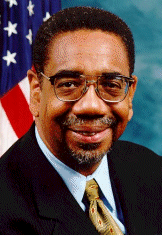
Rep. Bobby
Rush (D-IL)
Schumer and Rush Introduce Bills to Regulate Internet Gun Sales
(March 30, 1999) Sen. Charles Schumer and Rep. Bobby Rush have introduced the "Internet Gun Trafficking Act of 1999" in the Senate and House. This proposal would, among other things, require any web site operator who facilitates the sale of firearms to become a federally licensed gun dealer.
|
Related Pages |
| Summary of Internet Gun
Sales Bills. Copy of S 637 IS, 3/16/99. Copy of HR 1245 IH, 3/24/99. Statement by Sen. Schumer, 3/16/99. Statements by Rep. Rush, 3/24/99. |
Sen. Charles Schumer (D-NY) introduced S 637 IS in the Senate on March 16, while Rep. Bobby Rush (D-IL) introduced the companion bill in the House, HR 1245 IH, on March 24.
Both bills would provide that, "It shall be unlawful for any person to operate an Internet website, if a purpose of the website is to offer 1 or more firearms for sale or exchange, or is to otherwise facilitate the sale or exchange of 1 or more firearms posted or listed on the website, unless the person is licensed as a manufacturer, importer, or dealer ..."
Both bills have been referred to the Judiciary Committees. Sen. Schumer, a former House member who was just elected to the Senate last November, is a member of the Senate Judiciary Committee. However, Rep. Rush sits on the House Commerce Committee.
 |
|
|
Rep. Bobby |
Rep. Rush described the current situation in a statement published in the Congressional Record: "Web site operators, who are not licensed gun dealers, facilitate firearms transactions between buyers and sellers. Web site operators run web sites which provide space for unlicensed individuals to post guns for sale. The web sites give names, phone numbers and/or e-mail addresses of sellers, to allow potential buyers the opportunity to contact the sellers directly for the purchase of firearms.
Rep Rush continued: "These transactions, while facilitated by the web site operator are not monitored by the web site operator, thus occurring out of anyone's eyesight, including law enforcement. As a result, many individuals, including children and felons are able to purchase firearms illegally and evade the law."
These bills are part of a growing trend. Many bills have already been filed in the just started 106th Congress to ban or regulate private activities conducted over the Internet which the bills' sponsors find to be harmful or odious. Other examples of such legislation include:
S 637 IS and HR 1245 IH would not ban the sale of guns over the Internet. Rather, they would create a new regulatory framework that would ban anyone other than federally licensed gun dealers from conducting or facilitating Internet gun sales, give new rule making authority to the Treasury Department, and set up a detailed set of procedures to be followed for non-inventory sales.
In addition to requiring federal gun dealer licenses, the bill would also require the web site operator to disclose whatever information to the Treasury Department that the Department requires by regulation.
Finally, for sales of firearms that are not a part of the seller's inventory (that is, arranging sales between two other parties) there is a long and complicated set of procedures to be followed.
Sen. Schumer has built his political career on advocating gun control legislation. Rep. Rush has experience with gun control laws.
Sen. Schumer explained his reasons for introducing this bill in a statement in the Congressional Record.
"The Internet affords computer users--including children and felons--easier-than-ever access to individuals offering firearms for sale. It also facilitates firearms transactions in which sellers and buyers need not meet face-to-face. For these reasons, individuals who are legally prohibited from purchasing or selling firearms can turn to the Internet to find others willing to engage in gun transactions with them--either knowing or not knowing of the illegality of such transactions. Unlike firearms sales at gun dealerships and even gun shows, illegal Internet firearms sales occur 'sight unseen,' thus presenting significant enforcement challenges for federal, state and local authorities."